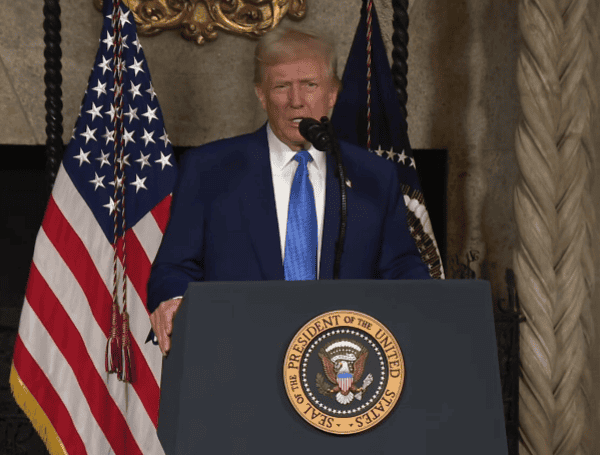The Trump administration issued a formal veto threat Monday morning regarding a bipartisan resolution that would terminate the president’s emergency powers underpinning his sweeping global tariffs.
The Senate is set to vote as early as this week on a resolution to rescind Trump’s national emergency declaration justifying the imposition of broad tariffs on imported goods. The White House Office of Management and Budget (OMB) said the president would veto the resolution in the event the resolution makes it to his desk, according to a statement of administration policy exclusively obtained by the Daily Caller News Foundation.
READ: Border Czar Tom Homan Defends Deportation Policies Amid Controversy Over Citizen Children
“There can be no doubt that S.J. Res. 49 — if passed — would undermine U.S. national and economic security,” the White House Office of Management and Budget (OMB) wrote. “If S.J. Res. 49 were presented to the President, he would veto it.”
Democratic Oregon Sen. Ron Wyden and Republican Kentucky Sen. Rand Paul are co-leading the effort to eliminate the foundation of Trump’s tariff authority. Congress has the power to force a vote on terminating the president’s emergency powers, which is subject to a simple majority vote in both chambers.
Trump issued a national emergency declaration April 2 to correct certain trade practices, including “the large and persistent annual U.S. goods trade deficit.” The administration has criticized trade imbalances for hollowing out the country’s industrial base, suppressing wages and leaving supply chains vulnerable.
READ: New Hampshire Sen. Shaheen Accuses Hegseth Of “Chaos” At Pentagon Amid Info Leaks
“President Trump refuses to let the United States be taken advantage of and believes that tariffs are necessary to ensure fair trade, protect American workers, and reduce the trade deficit — this is an emergency,” a White House fact sheet said regarding the president’s “Liberation Day” tariffs.
Trump declared a 90-day pause on most country-specific reciprocal tariffs April 9 with the exception of China after the administration said more than 75 countries had expressed interest in negotiating trade deals.
Despite the administration racing to craft trade agreements with dozens of countries, Wyden told Politico April 10 that he will seek to force a vote on eliminating the president’s emergency declaration.
“The President is now in active negotiations with many of these countries to eliminate barriers to U.S. exports,” OMB said. “Disturbing the conditions underlying these negotiations would signal to U.S. trading partners that they can continue to discriminate against U.S. exports with impunity.”
READ: Op-Ed: Pope Francis’ Difficult Legacy
Treasury Secretary Scott Bessent said Thursday that negotiations with South Korea over eliminating trade barriers “may be moving faster” than expected. Vice President JD Vance heralded progress on a trade deal with India during a visit to the country on Tuesday.
“Tariffs are taxes, and the power to tax belongs to Congress — not the president,” Paul, who has been a vocal critic of the president’s tariffs, said in an April 8 statement. “Our Founders were clear: tax policy should never rest in the hands of one person. Abusing emergency powers to impose blanket tariffs not only drives up costs for American families but also tramples on the Constitution. It’s time Congress reasserts its authority and restores the balance of power.”
Trump criticized GOP lawmakers seeking to rein in his effort to reorder global trade during remarks at the National Republican Congressional Committee’s annual president’s dinner on April 8.
“And then I’ll see some rebel Republican, you know, some guy that wants to grandstand say, ‘I think that Congress should take over negotiations,’” Trump said. “Let me tell you, you don’t negotiate like I negotiate. If Congress takes over negotiating, sell America fast because you’re going to go bust.”
Paul also co-led a separate resolution with Kaine to block the president’s national emergency declaration justifying tariffs on Canada on April 2. This resolution passed the Senate 51 to 48 with three Republicans in addition to Paul voting to terminate the president’s tariffs on Canadian imports. Speaker Mike Johnson refused to take up the resolution in the House.
The Wyden-Paul resolution targeting Trump’s global tariffs also faces long odds to land on the president’s desk given the speaker’s decision to stall a vote on the measure. House Republicans inserted language in a procedural rule for the Trump-backed budget blueprint on April 9 preventing a vote on the resolution until Sept. 30.
Please make a small donation to the Tampa Free Press to help sustain independent journalism. Your contribution enables us to continue delivering high-quality, local, and national news coverage.
Connect with us: Follow the Tampa Free Press on Facebook and Twitter for breaking news and updates.
Sign up: Subscribe to our free newsletter for a curated selection of top stories delivered straight to your inbox.
